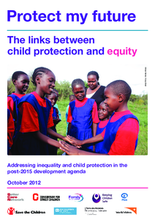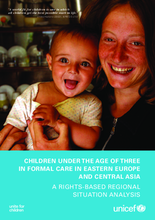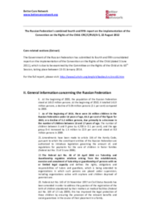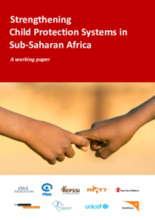Displaying 711 - 720 of 946
This article reviews the available evidence regarding the efficacy, effectiveness, ethics, and sustainability of approaches to strengthen systems to care for and protect children living outside of family care in low- and middle-income countries.
This article reviews the U.S. Government Evidence Summit on Protecting Children Outside of Family Care held in December 2011 in Washington D.C. The Summit brought together more than 150 of the world’s leading advocates for children to examine the strength of the research evidence on existing programs and interventions, and most importantly to identify critical knowledge gaps and areas where more research is needed so that systems and programs designed to improve the overall health and well-being of these vulnerable children may be strengthened.
The purpose of this review was to identify evidence-based early response strategies and interventions for improving the outcomes of children outside of family care, including children of and on the street, institutionalized children, trafficked children, and children affected by conflict and disaster, and who are exploited for their labor. A conclusion was drawn that there is a strong need for strengthening the evidence base regarding the effectiveness or early assessments and responses to children living outside family care and for using evidence to guide operational policy and practice.
The objective of this review was to strengthen the evidence-base for policy and practice for support of children outside of family care through effective, efficient and sustainable mechanisms for monitoring and evaluation. Findings show that fostering a stronger evidence-base to improve protection for vulnerable children requires evaluations that are integrated into program development, use context-appropriate methodologies able to assess intervention scalability and employ more longitudinal designs to explore children’s trajectories.
Recognizing the need for evidence to inform policies, strategies, and programs to care for vulnerable children, the U.S. Government convened an Evidence Summit on Protecting Children Outside of Family Care on December 12–13, 2011, in Washington, D.C., USA. This paper summarizes the background and methods for the acquisition and evaluation of the evidence used to achieve the goals of the Summit.
The lack of care and protection facing children is a global crisis with billions of children experiencing abuse, neglect or exploitation, and many millions growing up outside of families, on the streets or in harmful institutional care. This lack of adequate care and protection is commonly the result of inequalities. Children without adequate care and protection are stigmatized and have inequitable access to basic services which, severely diminishes life chances and creates a spiral of disadvantage. In order to break this spiral, the authors of this report recommend a three-pronged strategy.
Through a comprehensive statistical analysis and literature review, this UNICEF report provides a child rights-based up-to-date review of the situation of children under the age of three in formal care in the countries of Central and Eastern Europe and the Commonwealth of Independent States (CEECIS).
This report presents the findings from a two-year peer research project which includes the testimony of more than 300 young people with care experience in Albania, the Czech Republic, Finland, and Poland. More than 40 care leavers from the four countries were selected and trained to play an active role in the all aspects of the projects. The interviews revealed widespread inadequacies regarding the process of leaving care, promoting the research team to draw up recommendations to address them.
Care related sections of the Government of the Russian Federation's fourth and fifth combined report on the implementation of the Convention on the Rights of the Child (dated 3rd June 2011).
This paper is a response to the increasing need for agreement on approaches and documented evidence of good practices consistent with system strengthening work. The purpose of the Inter-Agency Working Paper is to consolidate current thinking, examples and lessons learned about child protection system strengthening in sub-Saharan Africa and suggest a way forward.





